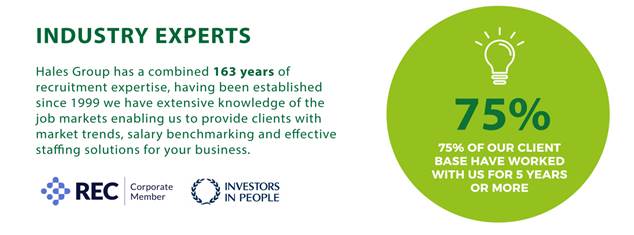Which Sectors Are Hiring During the Pandemic?

The COVID-19 pandemic has affected all of us, but some areas of the job market have felt the impact more than most. The world of work is changing rapidly, and while some sectors have felt the pinch, others are in a much better position.
As CV-Library explained, the number of job vacancies available during the second quarter of last year, had fallen by 62.7% compared to 2019. As for the jobs that are being advertised, the same report suggests that the average application per job ratio has risen by 84%.
But, with all this doom and gloom, what sectors are actually hiring at the moment and face a brighter future in spite of further uncertainty?
#1: IT & Digital Tech

IT and digital tech positions were increasing in popularity even before the pandemic hit and are continuing to thrive, particularly in the face of increasing numbers required to work from home in Lockdown Three.
The indications point to further growth in IT and demand for web marketing specialists, which will continue to be crucial to firms who are trying to grow post-pandemic.
#2: Logistics, Distribution & Warehousing
Since the arrival of the first lockdown measures back in March 2020, we’ve all been relying more on home deliveries and online shopping, which has seen an increase in available jobs in the logistics, distribution and warehousing sectors.
Online retail behemoth Amazon created 15,000 new full and part-time warehousing and delivery positions in their UK fulfilment centres in 2020.
At the same time, international delivery brand Hermes created 10,500 jobs, in which 1,500 delivery network and head office staff were hired, and 9,000 contract couriers were brough on board.
#3: Supermarkets & Grocery Retail

With hospitality venues closing during the lockdowns, we’ve not been able to enjoy eating and drinking out very much in the past 12 months. This has seen increasing demand placed on food and supermarket supply chains, which has had a knock-on effect in the number of jobs that are required to meet the increasing demand.
Between them, supermarket chains have taken on over 50,000 new employees during the pandemic, and while some of these were temporary positions, plenty of them were full-time jobs too.
These changes in demand have mostly impacted three areas:
- In-store roles – undertaking roles like restocking shelves.
- Online order processing – managing increases in home deliveries.
- Logistics – delivering products to supermarkets and those who are delivering orders to customer’s homes.
#4: Haulage
As we’ve touched on already, lorry drivers are in huge demand at the moment, according to the latest REC survey. Whether it’s delivering stock to online retail warehouses to fulfil customer orders, or taking extra deliveries to supermarkets, more and more goods are being transported by road at the moment.
It’s also thought that HGV mechanics and manufacturers may also be highly sort after by employers too, as we progress further into 2021. This demand comes as a stark contrast to the warnings we’ve heard over the past few years of the shortage of HGV drivers and mechanics. In the winter of 2019, the trade body, The FTA, warned that the UK was short almost 60,000 drivers.
#5: Cleaning Operatives
Domestic cleaners lost most of their income during the first lockdown since they were unable to visit their clients’ homes.
However, despite income from domestic jobs coming to a standstill again at the outset of Lockdown Three, many private businesses that have been able to remain open have required specialist cleaning to ensure they are complying with COVID requirements.
In fact, according to the British Cleaning Council, there has been an increase in demand across the board, particularly in care homes, health care settings and hospitals where the spread of the virus could impact many vulnerable people.
#6: Health & Social Care
The critical role that health and social care workers play in our society has never been more evident than throughout the COVID-19 pandemic.
But even with gratitude for healthcare workers deservedly at an all-time high, it’s still vital that there is as many people as possible working in frontline health to help combat the spread and take care of those who catch the virus.
LinkedIn saw a massive 104% increase in healthcare roles added to their platform, including doctors, nursers, home health assistants, elderly care support workers, health advisors, health coaches and much more. In addition to this, specialised medical roles grey by 58% in 2020 too.
How Can I Stand Out in Such a Competitive Job Market?
Ask Family & Friends
With hundreds of people potentially applying for the same roles as you, you should first leverage your personal network to gain an advantage.
Your family and friends between them will know plenty of people working for different businesses, and some of those may well be hiring at the moment.
With so many applying for roles, an employer certainly won’t object to a personal reference to help you stand out from the crowd – so it really is worth asking around.
Tailor Your CV
Your CV is also incredibly important. For example, at Hales, we always impart just how important it is to tailor your CV to each job role you’re applying for and clearly list relevant achievements that could appeal to the hiring company.
It’s also worth having someone read over your CV to pinpoint any grammar or spelling errors, which can often mean your CV ends up being tossed to one side.
Putting together a cover letter that clearly explains why you are so keen to work for this particular employer can often make the difference too. In fact, according to statistics from Monster, 86% of participants in a study said that cover letters were crucial when evaluating job candidates.
Although doing this for each job can be time-consuming, it means you’re giving yourself a much better chance of getting the result you desire.
If you have any questions about anything we’ve covered in this blog, you’d like to discuss the current vacancies we have available, or you need some advice on your job search, contact us today.
What to Consider if You’re Looking for a Career Change
Change is never an easy thing to manage, particularly when it comes to a career change.
Whether you’re desperate to the leave the current role you’re in, or you’re just looking to have a go at something new – a career change can sometimes be just the thing you need to revitalise your passions and desires.
The good news is, changing careers is often about getting yourself into the right mindset to develop a positive attitude, which is often enough to get the ball rolling.
In this blog, we’ll be covering a few things that you should bear in mind before making the leap.


Let’s Talk September Issue
The latest issue of our Let’s Talk Newsletter is now available! Subscribe to our newsletter and keep up to date with the latest #recruitment news, #legislation updates and more!
What Are the Benefits of Working with Hales Group?

While job boards, social media, and job advertisements are good ways to find a diverse array of options for your next hire, a good job agency is capable of offering numerous benefits for your business.
It’s thought that over 52% of job seekers are applying for jobs that they aren’t actually qualified to do. Among other benefits, using a recruitment agency means you filter out those candidates that are wrong for the position, and those who don’t have the skillsets for the role.
Access to Top Talent
Hales Group will work with you to understand your needs and actively search for the talent that is capable of fulfilling those needs. On top of this, the knowledge that our recruitment consultants possess on how to avoid hiring the wrong candidate can be extremely advantageous. Our recruitment specialists have the experience and expertise to filter out the wrong kind of candidate from the very moment they speak to them.
From the point in which a client has decided to hire someone new and established the criteria for the role, Hales Group can then begin to find the right person for that position. Quite often, the right candidate is one that is not actually actively looking for a new job but would be open to one if a good opportunity presented itself. Hales Recruitment Consultants have strong networks and the time to find these individuals; an employer will usually have neither of these available to them.
At Hales Group, we take the time to talk to potential candidates about their experience, background, skills and much more. Only then will we decide whether this candidate is a suitable one for the position.
Save Time & Money
Utilising a recruitment agency is quicker than hiring internally, in fact, at Hales Group it takes us, on average, just 12 days to fill a permanent role for our clients. Additionally, you’ll also save yourself a good deal of money. This is because our Recruitment Consultants can collect and assess CVs, double-check references and interview the candidate, so you don’t need to.
When a client chooses Hales Group, they also get the advantage of advertising their job across multiple leading job boards without the cost, a vast social media network and specialist consultants to screen and interview candidates. This results in a selection of only the most suitable candidates CVs.
Industry Knowledge

Hales Group has a combined 163 years of recruitment expertise, having been established since 1999.
The right recruitment agency will often employ recruiters with specific knowledge of a particular industry. This is why it’s so important to partner with a recruitment agency that understands the industry you’re operating in since they’ll be abreast of market trends, salary levels and the skills required to fill your role.
At Hales Group, we have a combined level of experience totalling 163 years and have been operating in the job market since 1999. With specialist recruiters throughout the company, this has given us a unique understanding of the local job markets and our clients’ industries, which is why 75% of our client base has been entrusting us with their recruitment for five or more years.
Salary Expectations
As an employer, you certainly don’t want to get to the end of the recruitment drive, thinking you have identified the perfect candidate only to discover that you’re absolutely miles apart when it comes to salary.
At Hales Group, we ensure that we find out the salary expectation of any prospect we put forward for a role to ensure that both you and the candidate are on the same page from the outset. This removes any ambiguity, any chance of offending the candidate with an offer that is well under their expectation and increases the likelihood of ensuring both parties are happy.
Industry & HR Legislation
The laws and legislation around employment are frequently subject to change. Most recently, of course, due to the coronavirus pandemic, we’ve seen a raft of changes around furloughing employees.
These changes can often be relatively complex and take a bit of time to understand. Other common areas for confusion centre around diversity in the workplace, wages, maternity and paternity leave and unfair dismissal.
At Hales Group, we see to it that we are always on top of any changes in recruitment to ensure there is no chance of any legal complications. We always ensure that our recruiters are kept abreast of any industry changes so you can be completely comfortable in the knowledge that all the correct procedures have been followed from the outset.
Helps Business Innovation & Growth
At Hales Group, we’ve worked with companies of all sizes over the years, from new startups to national corporations. Working with us can give your business the impetus to grow and innovate.
We don’t just provide people; we also offer the talent and support you need to take your business to the next level. To us, it’s always more than just recruitment.
If you’re interested in finding out more information about our recruitment services, don’t hesitate to contact us today.
New Recruitment Processes to Know About
Traditional recruitment processes such as perfecting your CV, and undertaking both phone and face to face interviews can all be daunting experiences, especially for those candidates without much experience in the field of job hunting.
However, it’s now becoming standard practice for businesses of all sizes to adopt new recruitment methods that delve deeper into a candidates personality and ability, in order to determine if candidates are not only going to live up to their performance promises made on paper; but also if they can think and adapt their skills quickly, and if their personal views and ethics are aligned with that of the company.
For businesses, recruitment can be expensive, and for those looking to further their career, it can be a long-winded procedure. Neither party wants to see their searches go to waste, and this is why new processes and methods such as emotional intelligence testing and practical assessments are being used to identify hidden qualities and behavioural traits to ensure that both parties will enjoy a long and successful career relationship.
Below, we will run you through some of the processes that you can expect to encounter whilst on your search for your next role.
Psychometric Assessments
Psychometric tests use a method that measures the mental capability and behavioural style of an individual. These tests also measure how suitable the candidate is for the job role they are applying for; by measuring a person’s aptitude and characteristics against what is required for the role, you will able to forecast how they will perform.
Employers use these tests to draw out hidden characteristics that are notoriously difficult to identify during an interview.
Psychometric tests are objective and are often split into two types; aptitude and personality.
Personality tests explore areas such as your interests, personal values and what motivates you, and analyses how your character would fit in with the company. They ask you a series of situation-based questions that scrutinise your emotions and behaviours, along with relationships based on varying situations.
The test will provide you with a statement about ways of feeling or acting, for which you mark how much you agree with the statement on a scale.
Aptitude tests assess your ability to reason and determine whether your skill set is aligned with the role. Your results are compared to a benchmark, and usually, a certain score must be achieved in order to ‘pass’ the test. These tests look at your numerical, verbal and abstract reasoning, situational judgement and how effective your response is in varying situations and how quickly and accurately you can error check.
There are varying psychometric tests to sit; you will be provided with a range of statements, which after reading, you will be required to answer a true or false question about. You will also be provided with images that have a pattern or sequence that you need to determine or be asked to look at graphs and charts and analyse and summarise the results that they depict.
The most common type of psychometric testing is the Myers Briggs Type Indicator (MBTI) and the Occupational Personality Questionnaire (OPQ).
Emotional Intelligence Tests
In the academic and business world, there is a legacy of an emphasis being placed on aspects of intelligence such as mathematical and verbal skills and logical reasoning; but in recent years, that emphasis has been also placed on the value of emotional intelligence.
An emotional intelligence test evaluates an individual’s capability to recognise their own varying emotions, along with the emotions of others, as well as using this emotional information to help them in their thought process and actions and ability to adapt to situations and environments successfully.
Emotional intelligence tests will provide you with a number of statements, such as, “I like learning new things”, “I am not satisfied with my work unless someone else praises me” and “I express my opinion even if there is a good chance that other people will disagree with me”. Candidates are required to choose how true or false the statement is with regards to you and your actions and feelings.
Practical Assessments
Hiring managers are often concerned that traditional processes such as the usual face to face interview, weren’t effective at extracting the right information to determine how strong a candidate would perform in a role.
The practical assessment technique was introduced in order to see how an applicant demonstrates a work-related skill, and also under some pressure, to see how true their knowledge and skills are that had been put forward on their CV.
Practical assessments usually come in the form of a written assessment such as an essay or report on a specified topic, or you may be asked to review and proof read documents before being asked to provide a summary; they usually last between 40-60 minutes.
Other examples of practical assessments include ‘in-tray or e-tray exercises’ and require the candidate to organise a workload in a synthesised business scenario; usually lasting between 30-60 minutes, candidates are asked to work through items including emails, reports, minutes and policy documents, prioritising them and explaining the response and strategy. Recruiters look for candidates who can work quickly, accurately and logically and who can justify their thoughts and actions.
Group Activities
Group activities usually involve up to ten candidates and are often used when organisations are recruiting for multiple vacancies. This process is used to assess an individual’s competency when it comes to team work, enthusiasm, and decisiveness and persuasion, as well as problem-solving and critical thinking.
Group exercises are likely to include ‘ice-breakers’ that encourage individuals to relax and a team to bond. This is usually followed by a discussion task, whereby a team is asked to reach a logical conclusion of a business scenario – all candidates are expected to contribute and be able to justify the conclusion.
Another common aspect of group activities is role play, such as mock meetings.
All of these processes are designed to gauge a candidates suitability for a role, so that an organisation is able to choose someone that will perform at a high level, and whose values and ethics are aligned with the companies, meaning that they will remain in the business for a significant period of time, and reducing the need to hire regularly – an expensive and inefficient model.







